Protection & non food items
Endless and aimless fights in Mogadishu have caused massive exodus of innocent people mainly women and children to the outskirts of Mogadishu seeking for a more secure environment. These people mostly end up in IDP camps. The majority of the fleeing women and children tend to head to Afgoi, Bal’ad, Jowhar, Mahaday and Warsheik where they face more harsh lives and are exposed to a number of violations from the host communities as well as militias and gunmen.
Women and children that end up living in the IDP camps occasionally face a number of violations such Sexual Gender Based Violence (SGBV), deprivation of food or rights to obtain humanitarian aid, children are exposed to child labour and are deprived from rights to go to school, the youth also are another vulnerable group that are affected by the general crisis.
Forms of SGBV
- Rape
- FGM
- Forced/Early Marriage
- Domestic Violence
- Sexual Exploitation
- Attempt rape
Objectives in Protection
- Protect the rights and livelihoods of extremely vulnerable individuals especially IDP women, youth an elderly.
- Promote group discussion amongst IDPs and stakeholder.
- Reduce vulnerability of the IDPs by providing Vocational skills and create a source of income.
- Protect the Rights of Children and Advocate for their rights.
- Investigate, document, monitor and advocate for the abused children.
- Reduce FGM practices on girl child among rural communities.
- Promote awareness on HIV/AIDS and its consequences among WOCCA’s targeted project areas.
- Integrated protection and livelihoods approach in the target areas.
SGBV Victims
Who is likely to be a victim varies across the age. In Middle Shabelle and of course across the country women in different ages become victims to SGBV. There are young and old victims but the majority of victims are from 13 years, sometimes even younger, to 45 years old. This is the most vulnerable age group that can be victims of SGBV. We have an SGBV case in Jowhar where a lady of the age of 49 (current age 52) was raped and developed psychosocial problems. Young girls from the age of 5 to 12 do frequently fall victims to the myth of FGM.
Women who are likely to fall victims of SGBV:
Young girls that work as maids and live with host communities are extremely likely to be raped. And the sad thing about these women (girls) is that its difficult to come to know that they are victims. These young girls can suffer in silence for a long time or endanger themselves by running away from the host communities and their families.
Girls/Women who collect fire woods from the bush and sell in markets or just use it for fire wood at home for cooking purposes: Some girls/women work for their families and sell fire wood in the market. They go out to the bush to collect fire wood- that is when they fall victims of SGBV
Girls/Women who live in the IDP Camps: A group which is extremely vulnerable are the IDP’s. We have came to know that in Middle Shabelle, sometimes men will come the IDP camps in search of a woman to seduce and this mentality mostly leads to rape incidents, especially when women go out to relieve themselves in the near woods.
Revenge Rape: there are times where revenge rape takes place and it affects women who are not necessarily minority but the incident affects them the same way.
Besides the series of rapes women suffer in the country there are also some other SGBV incidents such as Domestic Violence that affects not only women who are married but also the young girls who work as maids within the host communities.
FGM practices are also another SGBV violation to young girls in the country. This myth has violated and continuous to violate a numerous young girls in the country.
Coping Mechanism
There is a numerous ways victims cope with the situation and the problems. There are three major problems faced by the victims when they are raped. A) The physical injuries that has been inflicted upon the victim. B) The fear of stigmatization- not only the victim has this fear, but the family of the victim as well and C) The psychosocial problem the victim faces
- Qur’an: When one is inflicted with horrible physical and psychosocial damage, families tend to immediately resort to Qur’an- they keep the victim at home, call imams and recite the Qur’an on the victim on a weekly basis and hope for the best that the condition of the victim gets better.
- Time healing: Some families keep the victim at home and don’t take them to hospital or/and don’t take any further actions in terms of healing or helping the victim heal. These families expect time to heal and resolve the problems
- Marriage: There are families that resort to arranged marriage after the girl/women is being victimized. They either marry the girl out to a cousin who volunteers or if the family is lucky they will find the perpetrator and ask him to marry the girl he’s raped. This is popular coping mechanism because even elders will recommend this after the rape incident
- Move away from the area: victims and their families move away from the area the incident took place in fear of stigmatization
- Clan Members help financially: In some rare occasion clan members come together and help the victimized girl/woman financially so that family can give the victim proper care
- NGO help: Some Local NGO’s such as WOCCA do provide some form of limited help to SGBV victims especially when the case is fresh. WOCCA does advocate for SGBV victims but to persecute perpetrators is a bit difficult in all over the country as most of perpetrators are extremely armed or/and are from strong clans.
On-going Interventions
WOCCA has recently completed a protection programme (Community based emergency intervention in favour of IDPs population Middle-Lower Shabelle regions in South Somalia”) with Intersos/UNHCR. this programme targets the Female headed households, children, youth and EVI’s (Extremely Vulnerable Individuals). The aim of the programme is to collect information on the IDP’s regarding livelihood, protection, sanitation etc. WOCCA has built a total of 12 structures (Four women centres and four youth centres) in Afgoi and (Two women centre and Two Youth Centres) in Jowhar. All centres are equipment with materials, for instance: women centres received tailoring machines plus a trainer. Youth centres received educational materials i.e. books, boards, pens, art material, qur’an books, sport clothes and a sport trainer for six months. We have also created child friendly spaces with the women centres in Lower-Middle Shabelle. This includes research on SGBV but no further actions are currently planned to be implemented in regards to SGBV.
Other actors working in this cluster
No other actor has ongoing programmes in Middle Shabelle. However Intersos is planning to enhance and further their existing programme (which came to end on January 2009) with the focus on reducing the vulnerability of women to SGBV. They want to do this through support to vocational training (focusing IDP’s).
In Lowe Shabelle (Afgoi) (the most dangerous and sensitive areas in the country) there are two many partners running programmes and its difficult to know who is doing what as there is no proper coordination. However we have not come across any organisation working on SGBV in this particular area.
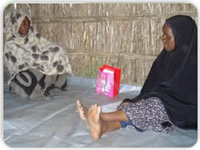 WOCCA team speaking to tps’s |
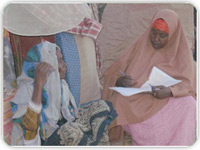 Speaking with SGBV Victim |
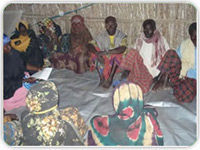 Focus Group’s in the Galadi IDP |
 Speaking with women communities in Biassa |
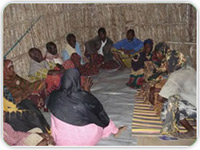 Focus Groups sitting and discussing the SGBV issues in centres build by WOCCA with the help of UNHCR/Intersos |
 WOCCA team talking to women groups in their settings (Biassa) |
Cases of SGBV
As the information is extremely sensitive in regards to the cases and what happened to the victims, WOCCA will not publish the information in the website. Would you require the cases please request by emailing us at Jowhar@woccaorg.com
WOCCA’s objectives of the protection programme aims to prevent physical and mental violations; to provide victims with medical/material and counselling assistance; to promote the general safety of the IDPs and Vulnerable persons, more so the children by ensuring that there are child friendly spaces within the community and to influence the formulation of policies and laws in the communities or the Government. WOCCA’s protection programme also integrates with Livelihood, WASH and Education sectors to ensure an all rounded protection mechanism. The protection programmes in achieving its objectives includes the following components:
1. GBV prevention
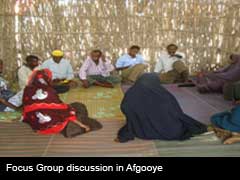 GBV prevention activities aim to ensure the protection of the IDPs and Vulnerable persons especially women and children. This is achieved through: Construction and rehabilitation of protection community centres to act as protection points for the women, Youth and the most vulnerable community members for conduction of informal
education classes and training and gathering venues;
Focus Group discussion in Afgooye
Focus group discussions for the community members on topics that affect them; and Sustaining and supporting the Protection community Centres through the creation of community based committees on protection violations especially for SGBV related cases.
GBV prevention activities aim to ensure the protection of the IDPs and Vulnerable persons especially women and children. This is achieved through: Construction and rehabilitation of protection community centres to act as protection points for the women, Youth and the most vulnerable community members for conduction of informal
education classes and training and gathering venues;
Focus Group discussion in Afgooye
Focus group discussions for the community members on topics that affect them; and Sustaining and supporting the Protection community Centres through the creation of community based committees on protection violations especially for SGBV related cases.
2 GBV responses
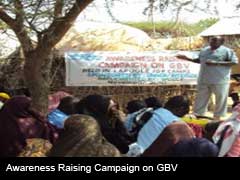 GBV Response activities aim to assist the vulnerable and the violated persons in the community to cope and overcome the psychological, emotional, physical and economical problems that they undergo. This is achieved through: Improving health/ clinical/ psychosocial support and referral system and follow ups for the victims especially the Sex and Gender based victims; organising self help groups or individual support session within the community by the community members themselves with the help of community health workers; Sustaining and supporting the Protection community Centres with roving mobile community health workers and psychosocial counsellors; and Provision of material assistance and medical fees to the GBV survivors
GBV Response activities aim to assist the vulnerable and the violated persons in the community to cope and overcome the psychological, emotional, physical and economical problems that they undergo. This is achieved through: Improving health/ clinical/ psychosocial support and referral system and follow ups for the victims especially the Sex and Gender based victims; organising self help groups or individual support session within the community by the community members themselves with the help of community health workers; Sustaining and supporting the Protection community Centres with roving mobile community health workers and psychosocial counsellors; and Provision of material assistance and medical fees to the GBV survivors
3. advocacy and capacity building
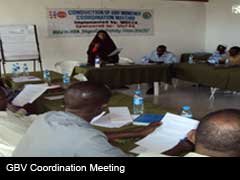 Wocca aims to empower the communities with life saving information and life skills knowledge which ensure that the communities are self sufficient and less exposed to vulnerable situations that make them succumb to protection violations. This takes the form of trainings, awareness campaigns, advocacy messages and vocational trainings. The activities include: Improving the life skill knowledge through skill training activities (tailoring, carpentry, etc) and through adult education and vocational trainings which are aimed at improving the chances for employment especially for the youth; Airing messages through radio on prevention of violence against women and other related messages to help promote the prevention and response mechanisms in the cases of either witnessing or being directly involved; Staff trainings on how to identify the EVIs, how to support the community and IDP victims in case of violations and the referral cases and GBV IMS;
Improving awareness and knowledge on social and legal issues to equip the community with life saving information to help them prevent and respond to the protection violations, other topics include; social rights, MRE, Gender equality, migration risks and opportunities and hygiene and sanitation promotion among other
Wocca aims to empower the communities with life saving information and life skills knowledge which ensure that the communities are self sufficient and less exposed to vulnerable situations that make them succumb to protection violations. This takes the form of trainings, awareness campaigns, advocacy messages and vocational trainings. The activities include: Improving the life skill knowledge through skill training activities (tailoring, carpentry, etc) and through adult education and vocational trainings which are aimed at improving the chances for employment especially for the youth; Airing messages through radio on prevention of violence against women and other related messages to help promote the prevention and response mechanisms in the cases of either witnessing or being directly involved; Staff trainings on how to identify the EVIs, how to support the community and IDP victims in case of violations and the referral cases and GBV IMS;
Improving awareness and knowledge on social and legal issues to equip the community with life saving information to help them prevent and respond to the protection violations, other topics include; social rights, MRE, Gender equality, migration risks and opportunities and hygiene and sanitation promotion among other
4. GBV coordination
Wocca is the GBV focal point organization in Lower Shabelle. With this, Wocca is mandated to coordinate monthly GBV meeting which is meant to bring all the stake holders together including the community elders, other local organizations and the IMAMs to discuss how protection violation cases manifest themselves in society, the effects of these violations to the family members and more so the victims, possible resolution mechanisms and strategies; and the way forward for the community in dealing with the various protection violations in the communities.
Would you like to participate in our efforts in helping vulnerable groups of Somalia please click ‘get involved’ and then DONATE. Would like to volunteer your time with us please contact us through this website


 Somalia
Somalia Kenya
Kenya